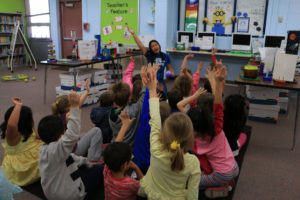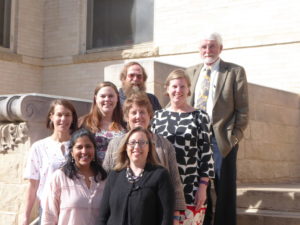 Colorado State University’s Robert Noyce Scholarship, a grant supported by the National Science Foundation, awards $10,000 to undergraduate STEM (science, technology, engineering, and math) majors who are considering a career in teaching. In return for every year of funding they receive, students commit to teaching two years at a high-need school after they graduate.
Colorado State University’s Robert Noyce Scholarship, a grant supported by the National Science Foundation, awards $10,000 to undergraduate STEM (science, technology, engineering, and math) majors who are considering a career in teaching. In return for every year of funding they receive, students commit to teaching two years at a high-need school after they graduate.
In the past seven years, the Noyce program has helped support more than 60 CSU students, most of whom are now teaching STEM subjects at middle and high schools throughout the country.
Meena Balgopal, principal investigator for the Noyce program at CSU and associate professor of biologyin the College of Natural Sciences, said the program helps provide support to high-achieving students who are interested in teaching. “We try to identify students who are genuinely interested in teaching, and especially teaching the kind of population that the grant is serving,” Balgopal said.
 Schools – and teachers – in need
Schools – and teachers – in need
Colorado, like the rest of the country, is experiencing a teacher shortage. According to the Colorado Department of Education, the shortage is at a near crisis level in rural areas, where schools have particular trouble retaining math and science teachers. Additionally, rural areas, such as the eastern plains, contain many of the state’s high-need schools.
The National Science Foundation uses multiple factors to determine whether a school is high-need. These include teacher turnover, student socioeconomic status, and the number of teachers teaching outside their licensure area.
The Noyce program is focused on addressing the demand for well-prepared teachers in these high-needs areas, said Balgopal.
In addition to scholarships, CSU’s Noyce grant also provides funding for University research on ways to solve many of these issues through professional teacher development. One research area studies the role of mentors on new teachers’ desire to stay at a school. The other focuses on whether teachers who design lessons relevant to the local area will become more connected to that community.
Balgopal said that for a new teacher working in eastern Colorado, for example, this might include ecology lessons that feature shortgrass prairies rather than rainforests.
“We’re predicting that those novice teachers will likely become connected to that place – and that their curricula will be relevant for their students,” said Balgopal.
CSU’s Noyce Scholarship program began in 2010, when the National Science Foundation awarded the University a $1.2 million Phase 1 grant. That program focused on scholarships and expires at the end of 2017. In 2016, CSU was awarded an additional Phase 2 grant, which provides $800,000 for scholarships and research through 2020.
From research to scholarships, the program supports efforts “to recruit, train, and retain quality STEM teachers who will not only remain in the profession, but also thrive,” said Andrea Weinberg, a co-principal investigator on the Noyce grant at CSU and assistant professor of education at Arizona State University. Other researchers involved in the grant at CSU include Dean of the College of Natural Sciences Jan Nerger, Associate Director of the CSU STEM Center Laura Sample McMeeking, Professor of Mathematics Paul Kennedy, and Associate Professor of Civil and Environmental Engineering Thomas Siller.
Future teachers
If a student is thinking about becoming a teacher, Balgopal said they can get involved with STEM educational outreach on campus, such as with the Little Shop of Physics or the CNS Education and Outreach Center. She also recommends shadowing a teacher for a day at a middle or high school. Balgopal often connects CSU students with veteran teachers to help in science and math classes, giving them an opportunity to see if they enjoy teaching.
All it takes to get excited about teaching is getting your feet wet, Balgopal said.
If you’re a STEM major interested in applying for the Noyce Scholarship Program, inquire here for more information about how to apply.
The Noyce Teacher Scholarship Program is named for Robert Noyce, who co-founded Intel. Noyce was a proponent of technology education for all ages.
